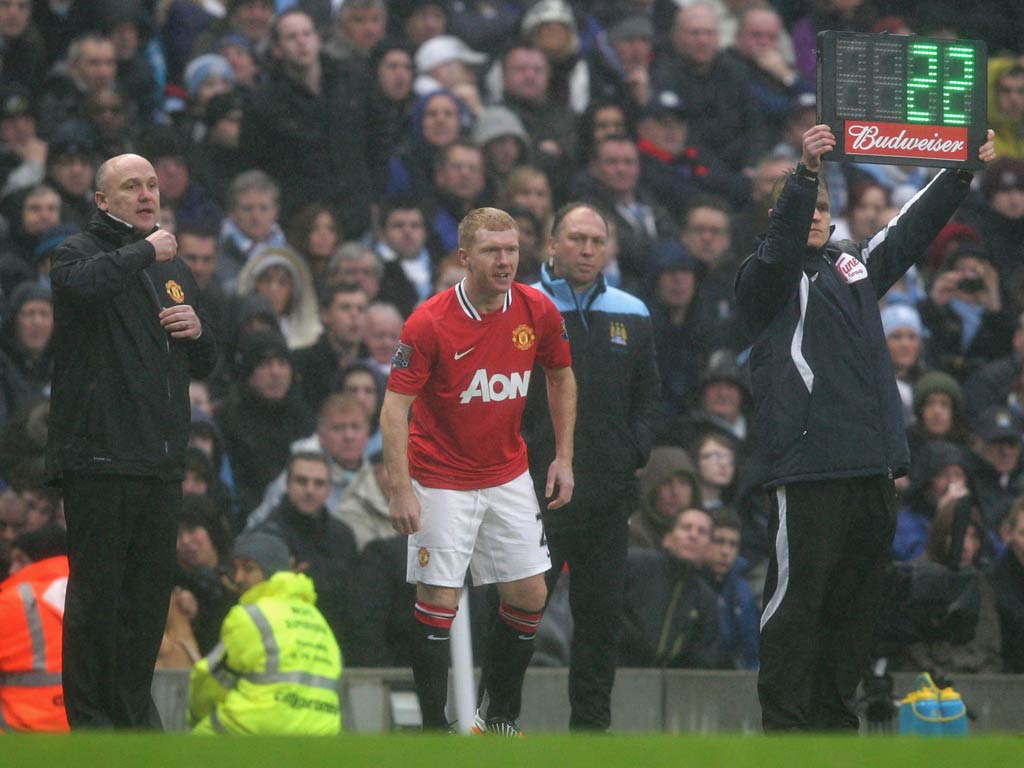
Your support helps us to tell the story
From reproductive rights to climate change to Big Tech, The Independent is on the ground when the story is developing. Whether it's investigating the financials of Elon Musk's pro-Trump PAC or producing our latest documentary, 'The A Word', which shines a light on the American women fighting for reproductive rights, we know how important it is to parse out the facts from the messaging.
At such a critical moment in US history, we need reporters on the ground. Your donation allows us to keep sending journalists to speak to both sides of the story.
The Independent is trusted by Americans across the entire political spectrum. And unlike many other quality news outlets, we choose not to lock Americans out of our reporting and analysis with paywalls. We believe quality journalism should be available to everyone, paid for by those who can afford it.
Your support makes all the difference.Sir Alex Ferguson has rejected the suggestion that Paul Scholes' Manchester United return is a step backwards.
The United manager sprang a major surprise when he confirmed Scholes had come out of retirement ahead of the FA Cup tie at Manchester City last Sunday.
Ferguson had not even told his players, so determined was he for the news not to leak out prematurely.
Yet, once the shock had subsided, many began to question why United needed the services of a 37-year-old and today's departure of Darron Gibson to Everton has brought yet more claims that books are being balanced at Old Trafford.
"There were no negatives as far as I was concerned," Ferguson said in a joint interview with Eurosport and www.yahoo.com, carried out in conjunction with the League Managers' Association.
"One or two people have been negative.
"They're making out it's been a 'regressive step' for Manchester United.
"How can it be regressive? You're getting a player for nothing who's been part of the club for 20-odd years.
"He's not going to play every game but in terms of composure and passing ability, is there a better player going around? Definitely not."
Once the decision was made, Ferguson's biggest dilemma was ensuring the news did not leak out, not even inside his own dressing room.
"I don't know how we managed it," he said.
"We registered him on the Friday, and thought somehow it would get out.
"But we didn't let any of the players know simply because of the impact value.
"We were going away from home in a very difficult FA Cup tie against City.
"We had 5,000 fans at that end of the ground and as soon as they knew his name was on the team sheet they were fantastic, there was a great response."
Ferguson has always reflected on the fact Scholes is one of the easiest players he has ever had to manage.
The demands are getting harder though as star names become wealthier and surrounded by an increasing number of agents and assistants to cater for their every whim.
"What you have to do is (ensure your players) understand how fragile that celebrity status can be," said Ferguson.
"One minute you're a star, the next minute you're not.
"Dealing with success is a bit more difficult today, because of television and the headlines they can get. So you do a lot of work with them to keep their feet on the ground.
"I say to them all the time: 'Go back to your mother the same person you were when you arrived. That's important, because I'm sure your mother doesn't like to see you change'. And we don't like to see them change either."
It is the template Ferguson likes to see followed, which is why he takes such pride in the success of old players when they enter the management game.
The latest is Ole Gunnar Solskjaer, who ended his first season at Molde by steering the club to a memorable Norwegian title triumph.
"Ole was one of these professionals who used to take down all the notes of the training sessions and games," said Ferguson.
"The problem for footballers today is that when they get to the end of their careers they decide to become coaches because there's nothing else in their mind that they think they can do.
"Whereas Ole always wanted to stay in the game so from an early age his preparation was (with a view to that).
"He's got an inner toughness, no doubt about that.
"Ole is a nice one. He's got a lovely manner about him.
"But if you go to a club like that (Molde) in Norway that has never won the league in their history and you win the league, you have to have something about you to do that."
PA
Join our commenting forum
Join thought-provoking conversations, follow other Independent readers and see their replies
Comments